Unveiling of China-Kenya Joint Research Center for Arid Agricultural Ecosystem at LZU
Edit Time: View:0
On 22nd April 2016 during the visit by Dr. David Mburu of Jomo Kenyatta University of Agriculture and Technology (JKUAT) to Lanzhou University (LZU) , the Joint Research Center plaque was unveiled. The Joint Research Center aims to enhance dry land agriculture research and help transform the way agriculture is practiced in the arid and semi-arid parts of the Kenya with the objective of improving livelihood among farmers in dry-land regions.
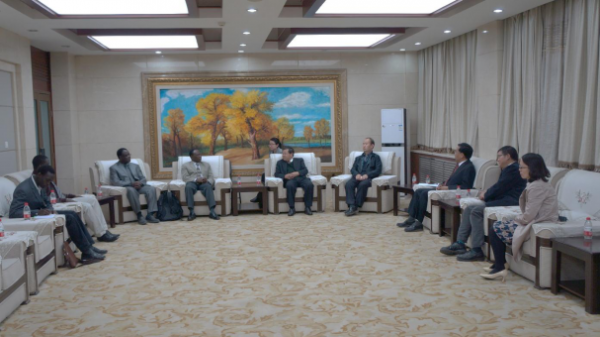
The Vice President of LZU; Prof. Pan Baotian welcomed the visit by Dr. David Mburu, he pointed out that the Chinese government is paying great importance to dry-land agriculture. LZU is located in the semi -arid region northwest china and is the best national university in dry-land agriculture in the region. He said that more focus has been given to Dry-land Agricultural ecosystems in Northwestern China and Ecological Restoration. Professor Xiong Youcai and Professor Li Feng Ming have been in the forefront in seeing the expansion of Micro-field rainwater harvesting technique (the ridge and furrow systems with plastic mulch) in Northwestern part of China.
The micro-field rain water harvesting technology -double ridge and furrow system covered with plastic film mulch had seen increase yields and improved livelihood in the farmers of these region . This technology has been welcomed by farmers of Kenya especially in semi-arid region.
Prof. Pan Baotian stressed the need to have improved research level and exchange visits. “Kenya on the other hand needs to pay attention to environmental conservation”. He mentioned that more openings for JKUAT under Chinese government scholarship are up for grab, this will allow students to come for exchange studies and aid in technology transfer. LZU School of International Cultural Exchange will provide an opportunity for language study.
The Dean, Faculty of Agriculture Dr. David Mburu thanked LZU for their commitment to the collaboration and their efforts in helping JKUAT spearhead dry land agricultural research in Kenya. He gave brief overview of how JKUAT came to be an excellent university in agricultural research. He said that food insecurity still remain to be the main problem facing African countries. “When a Country cannot feed itself, the development is derailed and moisture storage has been the challenge in Kenya’s Agriculture”.Dr. Mburu said. Dry land water-saving agriculture practiced in northwestern china will be an effective approach to solve the problems food insecurity.
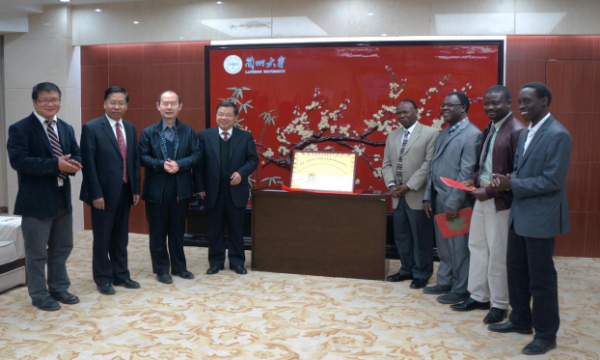
Prof. Xiong, Prof. Wang Yuhua, Prof. Prof. Li Fengmin and Prof. Pan Baotian of LZU and JKUAT team from right 4th Prof. Mburu, Prof Denis, Mr. Cosmas and Mr. Wesly unveil the Joint Research Center Plaque.
LZU has shown its commitment in the Joint ?Research project work by sending researchers; Lou Chong Liang and Zhang Xiaofeng - PHD scholars of LZU -in conducting trials and extension of this technology. In addition it has installed a modern weather station at JKUAT that will facilitate necessary information for modification of the technology according to regions weather variation and soil properties. The results have been impressive as farmers have been able to learn and accept the yield increase with use of micro-field rainwater harvesting technique.
Mr. Wesly Kiprotich hails from Kenya and is currently a beneficiary of Chinese government scholarship; pursuing graduate studies (Ecology) at LZU .He has achieved a remarkable progress in acquisition of dryland agricultural research techniques. Moreover, Mr. Wesly speak fluent Chinese language thus, he has been able to adjust well to life in Lanzhou and interact with various farmers in northwestern china making it easy for him to obtain information pertaining Dryland Agriculture and farmers’ livelihood. “Chinese farmers work hard on their field”. Mr. Wesly said.
With introduction of this technology, more farm demonstrations have to be conducted to facilitate dissemination over dryland areas in Kenya. Dr. David Mburu stressed on the construction of a factory that will manufacture the plastic mulch and avail to farmers at subsidized costs. In addition, the company will ensure farmers deliver the plastic residues for recycling. The advancement in technology has seen production of biodegradable plastic mulch that easily degrades leaving no residue.
On the basis of the previous collaboration between LZU and Jomo Kenyatta University of Agriculture and Technology on dryland agricultural research particularly extension of integrated rain-fed agricultural system and food security, significant results have been achieved.
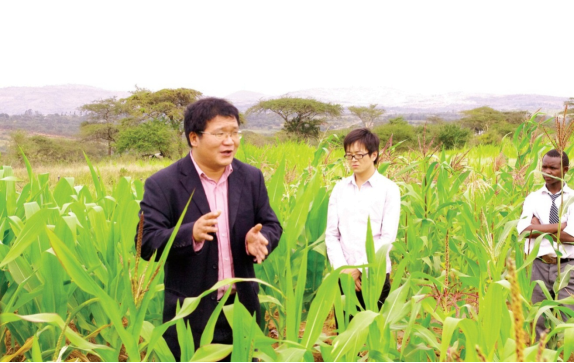
On 22nd April 2016 during the visit by Dr. David Mburu of Jomo Kenyatta University of Agriculture and Technology (JKUAT) to Lanzhou University (LZU) , the Joint Research Center plaque was unveiled. The Joint Research Center aims to enhance dry land agriculture research and help transform the way agriculture is practiced in the arid and semi-arid parts of the Kenya with the objective of improving livelihood among farmers in dry-land regions.
The Vice President of LZU; Prof. Pan Baotian welcomed the visit by Dr. David Mburu, he pointed out that the Chinese government is paying great importance to dry-land agriculture. LZU is located in the semi -arid region northwest china and is the best national university in dry-land agriculture in the region. He said that more focus has been given to Dry-land Agricultural ecosystems in Northwestern China and Ecological Restoration. Professor Xiong Youcai and Professor Li Feng Ming have been in the forefront in seeing the expansion of Micro-field rainwater harvesting technique (the ridge and furrow systems with plastic mulch) in Northwestern part of China.
The micro-field rain water harvesting technology -double ridge and furrow system covered with plastic film mulch had seen increase yields and improved livelihood in the farmers of these region . This technology has been welcomed by farmers of Kenya especially in semi-arid region.
Prof. Pan Baotian stressed the need to have improved research level and exchange visits. “Kenya on the other hand needs to pay attention to environmental conservation”. He mentioned that more openings for JKUAT under Chinese government scholarship are up for grab, this will allow students to come for exchange studies and aid in technology transfer. LZU School of International Cultural Exchange will provide an opportunity for language study.
The Dean, Faculty of Agriculture Dr. David Mburu thanked LZU for their commitment to the collaboration and their efforts in helping JKUAT spearhead dry land agricultural research in Kenya. He gave brief overview of how JKUAT came to be an excellent university in agricultural research. He said that food insecurity still remain to be the main problem facing African countries. “When a Country cannot feed itself, the development is derailed and moisture storage has been the challenge in Kenya’s Agriculture”.Dr. Mburu said. Dry land water-saving agriculture practiced in northwestern china will be an effective approach to solve the problems food insecurity.
Prof. Xiong, Prof. Wang Yuhua, Prof. Prof. Li Fengmin and Prof. Pan Baotian of LZU and JKUAT team from right 4th Prof. Mburu, Prof Denis, Mr. Cosmas and Mr. Wesly unveil the Joint Research Center Plaque.
LZU has shown its commitment in the Joint ?Research project work by sending researchers; Lou Chong Liang and Zhang Xiaofeng - PHD scholars of LZU -in conducting trials and extension of this technology. In addition it has installed a modern weather station at JKUAT that will facilitate necessary information for modification of the technology according to regions weather variation and soil properties. The results have been impressive as farmers have been able to learn and accept the yield increase with use of micro-field rainwater harvesting technique.
Mr. Wesly Kiprotich hails from Kenya and is currently a beneficiary of Chinese government scholarship; pursuing graduate studies (Ecology) at LZU .He has achieved a remarkable progress in acquisition of dryland agricultural research techniques. Moreover, Mr. Wesly speak fluent Chinese language thus, he has been able to adjust well to life in Lanzhou and interact with various farmers in northwestern china making it easy for him to obtain information pertaining Dryland Agriculture and farmers’ livelihood. “Chinese farmers work hard on their field”. Mr. Wesly said.
With introduction of this technology, more farm demonstrations have to be conducted to facilitate dissemination over dryland areas in Kenya. Dr. David Mburu stressed on the construction of a factory that will manufacture the plastic mulch and avail to farmers at subsidized costs. In addition, the company will ensure farmers deliver the plastic residues for recycling. The advancement in technology has seen production of biodegradable plastic mulch that easily degrades leaving no residue.
On the basis of the previous collaboration between LZU and Jomo Kenyatta University of Agriculture and Technology on dryland agricultural research particularly extension of integrated rain-fed agricultural system and food security, significant results have been achieved.
Prof.Xiong in Katumani, Kenya during experimental trials of Micro-field rain harvesting technique.
The experiments carried out by Professor Xiong Youcai team in Katumani, Kenya on the different micro-field rain-harvesting technologies showed an increase of yield from 90 to 500 percent and water use efficiency to 150 to 780 percent is achievable. Demonstrations of various techniques and farmers training had also been conducted in Juja and Katumani.
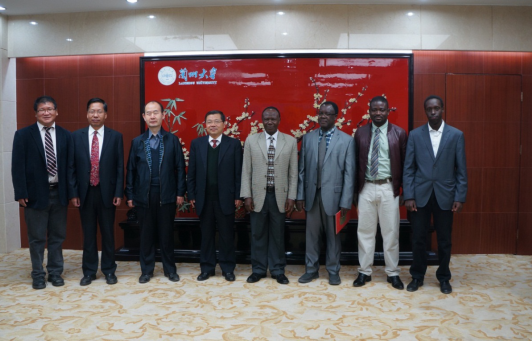
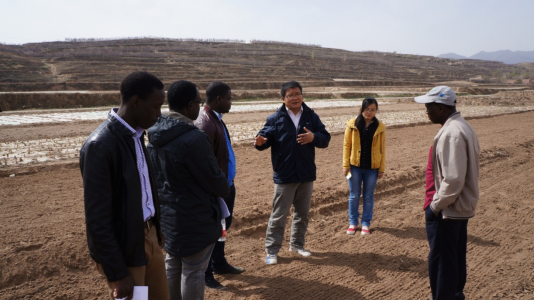
Professor Xiong in the middle displays the progress of rain-fed agriculture in Yuzhong County, Gansu, China, to; Professor Mburu of Jomo Kenyatta University of Agriculture and Technology , Professor Otieno and Mr. Cosmas of Bayreuth University ,Germany, Zhang Jain, Tian Tao and Mr. Wesly of LZU
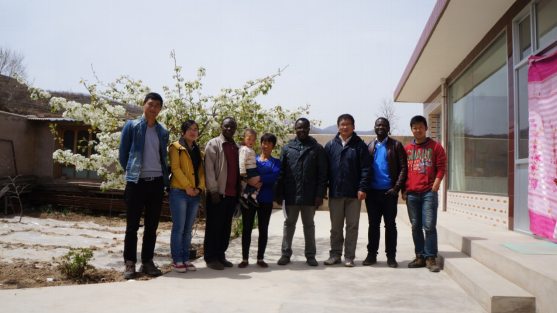
A visit to local farmer house to access the livelihood in Yuzhong County
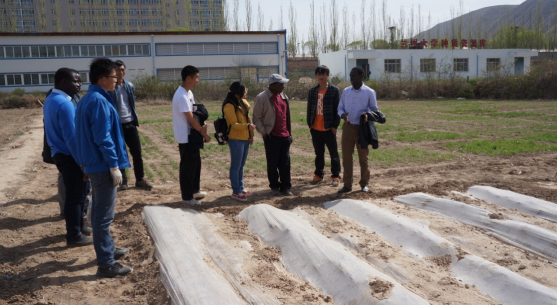
Mr. Wesly explains the mechanism behind micro-field rain water harvesting technology at LZU, Yuzhong County.
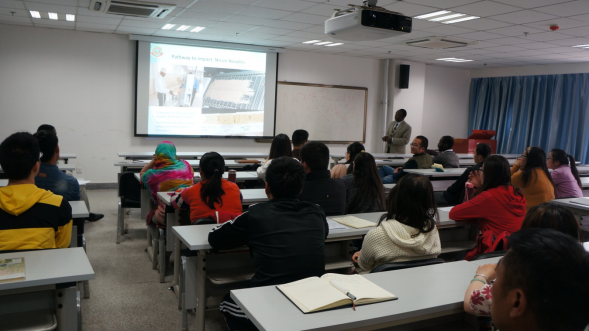
Professor David Mburu giving an overview of innovations at JKUAT.
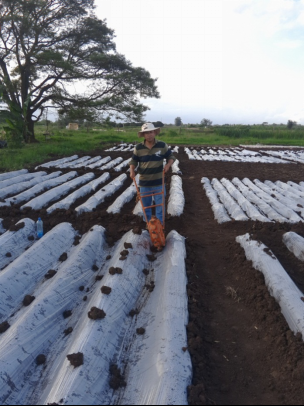
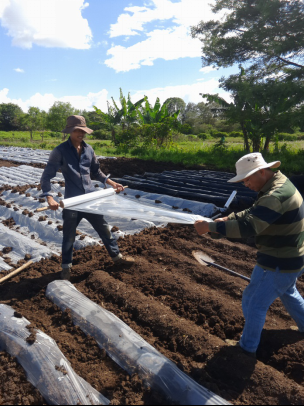
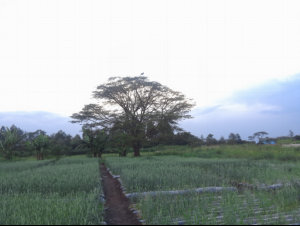
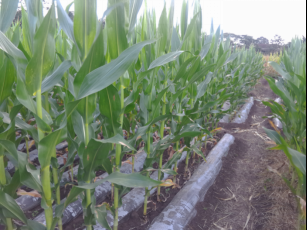
Lou Chongliang left and Zhang Xiaofeng right; PhD scholars at LZU conducting research work dryland rainfed agriculture in JKUAT, Kiambu County, Kenya.
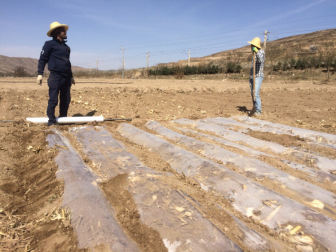
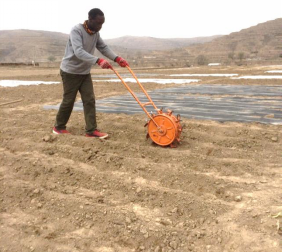
Ren Ai Tian, Sabir and Wesly; scholars at LZU currently conducting experiments at The Experimental Station of Crop Culture on Northwestern Loess Plateau,Dingxi.
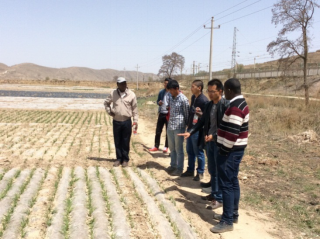
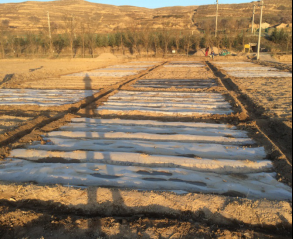
Second from right: Ma Ming Sheng of Gansu Academic of Agricultural sciences explains the procedures of plastic film installation for dryland crops during the visit by Professor Mburu -20th April 2016.
On 25th September,2015, during the visit by , Prof. Wang Cheng ;President of LZU, to Kenya, A Memorandum of Agreement for a student exchange between Jomo Kenyatta University of Agriculture and Technology and LZU, Prof. Wang Cheng pointed out the need for in-depth research in achieving Economic independence, technology advancement and industrial development. .
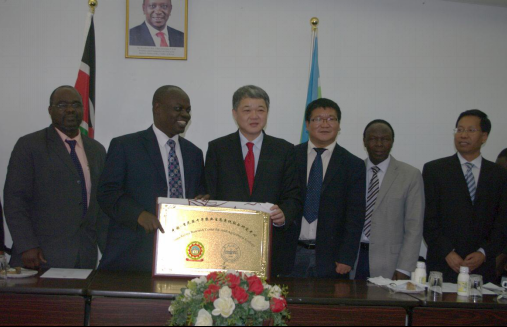
Prof .Wang Cheng, Prof. Wang Yuhua, Prof.Xiong of LZU with Prof. Mburu, Prof. Odhiambo and Prof. Nyende unveil the Joint Research Center Plaque in JKUAT during a past event.
Professor Xiong Youcai indicated that although 80% of Kenya lies in arid and semi-arid regions, a third of Kenya’s arable land can produce sufficient food to feed the nation. This is achievable through adopting advanced methods that have been successfully productive in China.

The previous visit by Prof. Wang Cheng; President of LZU to JKUAT.
The function was held in Yifu Building at LZU. It was attended by Pan Baotian; Vice president of LZU, Dr. David Mburu; Dean, Faculty of Agriculture JKUAT , Prof. Wang Yuhua ;Director of International Office LZU, Prof. Xiong Youcai, Professor Li Fengmin of LZU, Prof. Denis Otieno and Mr. Cosmas Kombat;Phd scholar of Bayreuth University,Germany and Mr. Wesly scholar at LZU.










